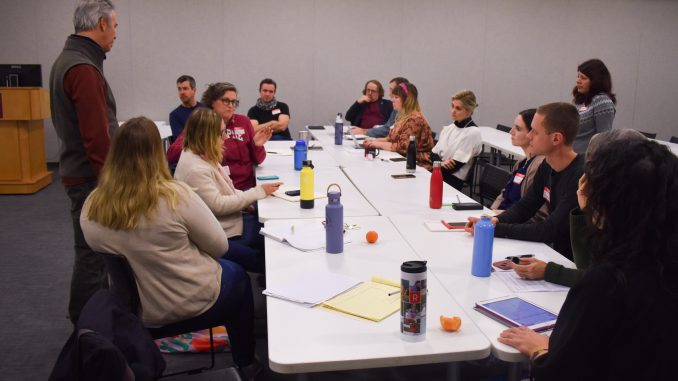
The Tyler School of Art and Architecture Climate Action Committee, a group of Tyler faculty and administration members dedicated to promoting sustainability on campus, held their inaugural meeting in the Architecture Building on Friday.
The committee, which “believes creative practice plays a critical role in addressing the collective concerns of our city and our global environment,” was formed on Nov. 21 at the school’s Collegial Assembly, a self-governing body for faculty, said Byron Wolfe, chair of the photography department. The assembly voted unanimously in favor of the committee, Wolfe said.
Wolfe proposed the creation of the group to his colleagues last summer following Temple’s announcement of an updated Climate Action Plan in Spring 2019, which calls on the university to reduce carbon emissions by 80 percent by 2050.
“It seemed timely for us to take the initiative as a school and start to try to meet some of the university’s Climate Action Plan,” said Wolfe.
At the meeting, attended by approximately 20 faculty and staff members, Rebecca Collins, Temple’s director of sustainability, gave a presentation about Tyler’s energy usage and carbon emissions. The committee then divided into two groups to discuss curriculum and programming related to carbon neutrality and energy usage at Tyler, coming together at the end of the meeting to share their plans.
“I think the climate action task force at Tyler is really exciting to me because it begins the conversation that’s specific to the college,” Collins said.
“In order for us to have a big impact and be successful, individual colleges are going to need to identify ways that they can contribute, and this group of people is really committed to doing that,” Collins added.
Members of the committee discussed new courses the school should offer to educate students on how to be environmentally conscious, existing university courses and programs which they can build on, initiatives faculty themselves can take to be more sustainable and the use of environmentally friendly art materials in classrooms and studios.
For example, Fauzia Sadiq Garcia, an adjunct professor of architecture, proposed a new course called Exterior Envelope which would teach students about how improved insulation can make buildings more energy-efficient.
Members also discussed plans to hold teach-ins to educate students about the role of the Climate Action Committee, collect data on Tyler students, faculty and staff’s energy usage, and reduce the amount of printing that faculty do.
The committee also discussed urging Tyler to commit to its own sustainability pledge.
Both members of the Ambler Campus Sustainability Council and Katherine Salisbury, director of the Ambler Arboretum, said that the Council plans on collaborating with the Tyler Climate Action Committee.
“For me, it’s looking to see how we at Ambler can use the data from Tyler to help make change,” Salisbury, a professor of landscape architecture and horticulture, said.
“It’s great for the Ambler Campus Sustainability Council to learn what is already in the works and rather than reinventing activities or goals, to join in on them and make them happen over at Ambler,” she added.
Wolfe plans on following up with members of the Tyler Climate Action Committee to determine the next steps for the committee. They will meet three to four times a semester, Wolfe said.


Be the first to comment